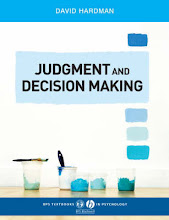The way in which children divide up resources is not only dependent on their liking for the other person, but children are also frequently able to predict how generous their classmates will be in an allocation task. They also tend to make friends with people whose allocation behaviour is more like their own. These are the conclusions from two recent studies of children's behaviour in social dilemma tasks.
Chris Moore, from Dalhousie University, asked children aged 4.5 - 6 to divide up brightly-coloured stickers between themselves and another child. Allocations were made to classmates who were identified as friends, to disliked classmates, and to strangers. Participants were shown a photograph of the stranger, called Sam or Sarah, whose sex was matched to that of the participant. The children were told that Sam/Sarah was the same age as them and went to a different school.
In prosocial trials children were given the choice of taking one sticker for themselves immediately or, at a later time, taking one sticker for themselves and one for the other person. In sharing trials they were given the choice of taking two stickers for themselves immediately and, at a later time, taking one sticker for themselves and one for the other person. Thus, on prosocial trials making a fair allocation had no cost to the children other than having to wait a little for their sticker, but on sharing trials the fair allocation meant that participants did not obtain the maximum possible for themselves.
On the prosocial trials disliked classmates were less likely to receive a sticker than either friends or strangers (who received a sticker with equal frequency). However, on the sharing trials - where fair allocations were not so beneficial for participants - both nonfriends and strangers were less likely to receive a fair allocation than were friends. The results did not appear to depend on the sex of the participant or of the recipient.
Although real-life social interactions often recur on a repeated basis, rather than a one-shot game of the kind used here, successful cooperation is facilitated if there is cooperation on the first move. Moore's study suggests that children are likely to make a positive first move with strangers as long as their is no cost to themselves.
In another study, Julia Pradel, Harald Euler, and Detlef Fetchenhauer asked 127 students (age 10-19) to allocate a share of some money to an anonymous classmate (the share could be zero). After making the allocation the participants were asked to estimate how each of their classmates had behaved in the allocation task. Finally, they listed which of their classmates they were friends with, who they simply liked, and who they disliked.
Forty-nine per cent of participants allocated exactly half to the anonymous other, 8% kept everything for themselves, and the remaining 43% allocated somewhere in between. More importantly, the participants were able to predict at above-chance levels which of their classmates would keep the money for themselves. Contrary to the authors' initial expectations, altruistic students were not more liked than egotistical ones. However, this result is less surprising in light of the other main finding: students tended to be friends with people who were more like themselves. Altruists tended to be friends with other altruists and egoists were friends with other egoists.
Participants made more accurate predictions about their friends than about those they disliked, which indicates that the results could not be entirely explained by the consensus effect (whereby people think others will behave they same way they do), although there was some evidence for this too. The authors conclude that people tend to assort themselves in their friendships along the dimension of altruism. This would help to explain why altruism persists in the face of egoism; altruists tend to avoid social interactions with those that they believe will behave in an egoistic fashion.
References
Moore, C. (in press, 2009). Fairness in children's resource allocations depends on the recipient. Psychological Science. DOI 10.1111/j.1467-9280.2009.02378
Pradel, J., Euler, H.A., and Fetchenhauer, D. (2009). Evolution and Human Behavior, 30, 103-113.
Saturday, 13 June 2009
Subscribe to:
Post Comments (Atom)
About Google Analytics
This website uses Google Analytics, a web analytics service provided by Google, Inc. (“Google”). Google Analytics uses “cookies”, which are text files placed on your computer, to help the website analyze how users use the site. The information generated by the cookie about your use of the website (including your IP address) will be transmitted to and stored by Google on servers in the United States . Google will use this information for the purpose of evaluating your use of the website, compiling reports on website activity for website operators and providing other services relating to website activity and internet usage. Google may also transfer this information to third parties where required to do so by law, or where such third parties process the information on Google's behalf. Google will not associate your IP address with any other data held by Google. You may refuse the use of cookies by selecting the appropriate settings on your browser, however please note that if you do this you may not be able to use the full functionality of this website. By using this website, you consent to the processing of data about you by Google in the manner and for the purposes set out above.




No comments:
Post a Comment